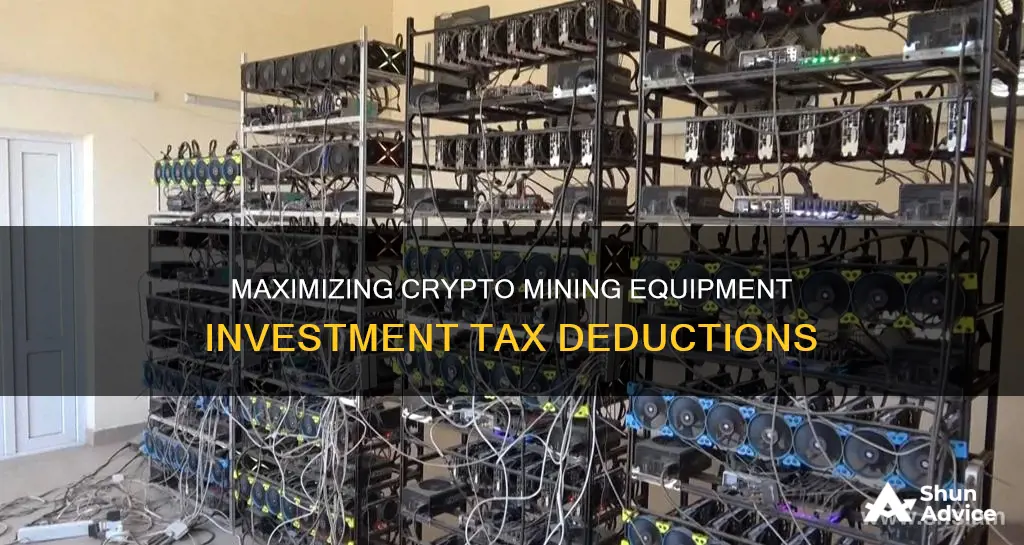
Crypto mining is a costly business, and miners are looking to take advantage of tax breaks to maximise their profits. The IRS treats cryptocurrency mining income as business income, so miners must report their income and pay taxes on it. Miners can deduct the depreciation of their mining equipment from their business income, reducing their net profit. In most cases, the entire purchase price of the equipment can be deducted in the year it was purchased using special Section 179 depreciation rules.
| Characteristics | Values |
|---|---|
| Tax treatment | Depends on whether it is a hobby or a business |
| Hobby mining | Not eligible for business deductions |
| Business mining | Eligible for tax deductions |
| Tax deductions | Mining equipment, electricity costs, rental expenses, home office expenses, repairs to equipment |
| Tax status | Miners may have to pay income tax, capital gains tax, and self-employment tax |
| Tax evasion | Not reporting mining rewards is considered tax evasion and can result in fines and prison time |
| Tax software | Koinly, CoinLedger, TokenTax, TurboTax, TaxAct |
| Tax professionals | CPAs, tax attorneys, enrolled agents |
What You'll Learn

Deducting electricity costs
The cost of electricity is one of the most significant expenses for cryptocurrency mining operations. Due to the high energy demands of crypto mining, electricity expenses can easily run into the thousands of dollars each year. As such, it is important to understand how these costs can be deducted from your tax bill.
In the US, cryptocurrency mining income is taxed as regular income, and miners must also pay capital gains taxes when they dispose of mined tokens. Crypto mining tax rules differ between hobbyists and businesses. If you are running a mining business, you can deduct your mining costs as business expenses. This includes electricity costs, which can be deducted as a business or trade expense. However, if you are mining from home or another property that uses electricity for purposes other than mining, you can only deduct the portion of your electricity bill that is attributable to crypto mining. Therefore, it is important to keep careful records of your electricity usage, and a separate meter may help with this calculation.
Miners with access to cheap electricity have a significant competitive advantage in terms of profitability. Even mining businesses in higher-cost areas can deduct their mining-related electrical costs from their business income, reducing their net profit. For example, South Korean Bitcoin miners can deduct electricity costs from their crypto tax filings.
In addition to electricity costs, other mining-related expenses that can be deducted as business expenses include equipment expenses, such as the cost of a mining rig, and the cost of repairs to equipment.
Best Cryptocurrency Investment Options: Current Opportunities
You may want to see also

Depreciating mining equipment
Depreciating crypto mining equipment is a complex topic and it is highly recommended that you consult a tax professional for advice on your particular scenario.
In the US, the IRS allows miners to deduct the depreciation of their mining equipment. There are several ways to do this. One way is to use the Accelerated Cost Recovery depreciation methods recognised by the IRS, which typically involve deducting the value of mining rigs over a span of three to five years. Another way is to deduct the entire purchase price of the equipment in the year it was purchased using special Section 179 depreciation rules.
Section 179 depreciation rules allow a taxpayer to expense property placed in service during the tax year (up to $510,000). To qualify, the depreciable property must be tangible personal property, other tangible property (except buildings and structural components), single-purpose agricultural or horticultural structures, storage facilities (except buildings and structural components), off-the-shelf computer software, or qualified real property. Additionally, the property must be acquired by purchase from a third party (gifts do not apply), and the amount deducted cannot exceed the amount of income earned in a trade or business.
Another method for depreciating mining equipment is the Special Depreciation Allowance (also known as Bonus Depreciation). This allows for the expensing of 50% of the cost of a fixed asset immediately, provided that the property is depreciated under MACRS, has a useful life of at least 5 years, and was first placed in service after August 31, 2008.
Finally, MACRS depreciation is the depreciation methodology allowed for most tangible personal property. Depreciation percentages are multiplied by the non-expensed cost (the basis) of the asset to derive the current year's depreciation. Fixed assets classified as asset class 00.11 information systems (computer equipment) are subject to a 7-year useful life.
Bitcoin's Legitimacy: A Viable Investment Option?
You may want to see also

Claiming losses on other investments
Crypto mining can be a costly endeavour, and there are several ways to offset these costs through tax deductions. Firstly, it is important to understand how the IRS classifies cryptocurrency mining income. The IRS treats cryptocurrency mining income as business income, and miners who receive rewards worth over $400 in a calendar year must report their activity. This income must be reported as self-employment income on Schedule C of the tax return and is subject to ordinary income tax plus a self-employment tax.
One way to reduce the tax burden is to own the mining equipment through a company and be treated as a business entity rather than a self-employed individual. Corporate tax policies can be more favourable, especially if there is a significant net income. For example, using an S Corporation structure may eliminate the need to pay the self-employment tax on a portion of the mining income.
Additionally, miners can deduct the depreciation of their mining equipment. The IRS allows for the deduction of the entire purchase price of the equipment in the year it was purchased using special Section 179 depreciation rules. Alternatively, the value of the equipment can be deducted over a span of three to five years using the Accelerated Cost Recovery depreciation method.
Another significant cost for miners is electricity, and these mining-related electrical costs can be deducted from business income, reducing the net profit.
If there is a net loss on a mining operation, these losses can be used to offset other income. Therefore, it is essential for mining companies to accurately document all business expenditures to maximize tax savings.
Furthermore, crypto mining taxes differ between hobbyists and businesses. Hobby mining is a simpler approach, but it is not eligible for business deductions. On the other hand, businesses may qualify for tax deductions and can write off expenses. To establish a mining operation as a business, it must be incorporated or set up as a sole proprietorship, providing legal protections and allowing for tax deductions.
Overall, the tax rules for cryptocurrency miners can be complicated, and it is advisable to consult a credentialed tax professional to determine the best options and ensure compliance with IRS regulations.
Bitcoin: A Risky Investment Move for Companies
You may want to see also

Deducting office space costs
However, if your crypto mining activity qualifies as a business, you can deduct the cost of renting office space as a business expense. This is separate from any deductions or capitalization of equipment costs. If you run your mining operation from a home office, you can also deduct a portion of your housing costs. The IRS provides guidance to calculate this, or you can use the simplified option, which deducts a set rate based on the amount of square footage dedicated solely to your business.
It is important to note that if you are mining as a business, the net profit from crypto mining is subject to "self-employment tax", which is an additional 15% tax on top of the normal income tax. Therefore, it is essential to carefully consider your mining activity's classification and consult a tax professional to determine the correct taxable treatment.
Atocha Coins: Worthy Investment or Risky Business?
You may want to see also

Deducting repair costs
When it comes to deducting repair costs for crypto mining equipment, there are a few things to keep in mind. Firstly, it's important to understand the difference between tax deductions for crypto mining done as a hobby versus as a business. If mining is your hobby, you can only deduct repair expenses up to the level of your mining income. This is known as the "hobby loss rule". On the other hand, if you're running a legitimate business, there is no limit to how much you can deduct in repair expenses, as long as they are reasonably related to earning business income.
Now, let's delve into the specifics of deducting repair costs:
- You can deduct the costs of repairs and maintenance that extend the useful life or improve the value of your crypto mining equipment. Routine costs like cleaning are not deductible.
- Repair costs can only be deducted in the year they are incurred. If you pay for a multi-year maintenance contract, only the portion applicable to the current year can be deducted.
- Keep accurate records of the cost of repairs. In the case of an IRS audit, you will need to provide proof of these expenses.
- If you're claiming deductions for other expenses, such as equipment depreciation or electricity costs, make sure to keep those records as well. The IRS may scrutinize these "mixed-use" expenses between business and personal use.
- Consult with a tax professional or accountant who specializes in crypto mining taxes to ensure you're taking advantage of all applicable deductions and following the correct procedures.
Dentacoin Investment: A Beginner's Guide to Getting Started
You may want to see also
Frequently asked questions
You can deduct the cost of your crypto mining equipment as a business expense if you are classified as a trade or business. This includes repairs to your mining equipment.
Hobby miners are typically characterised as small-scale mining operations. Hobby miners are not eligible for business deductions.
If you are classified as a trade or business, then you must pay self-employment taxes. If you are a hobby miner, you do not need to pay self-employment taxes.
The Section 179 depreciation deduction allows you to deduct the entire purchase price of your mining equipment in the year it was purchased.
You can deduct electricity costs, rental expenses, and home office expenses as a miner.







